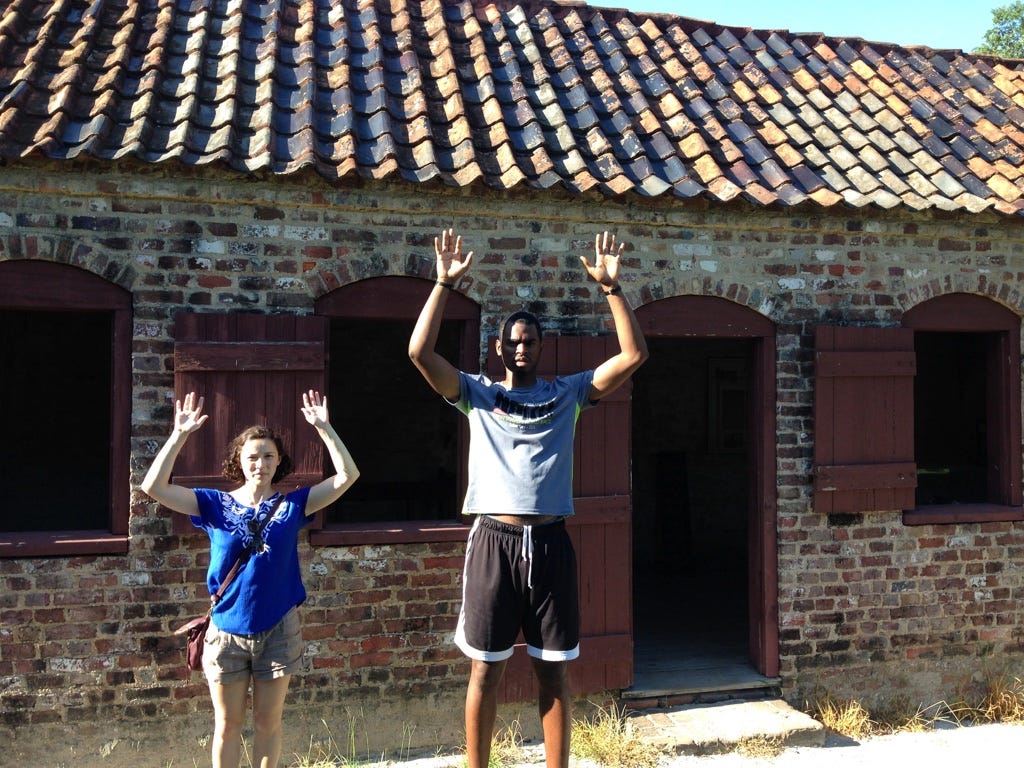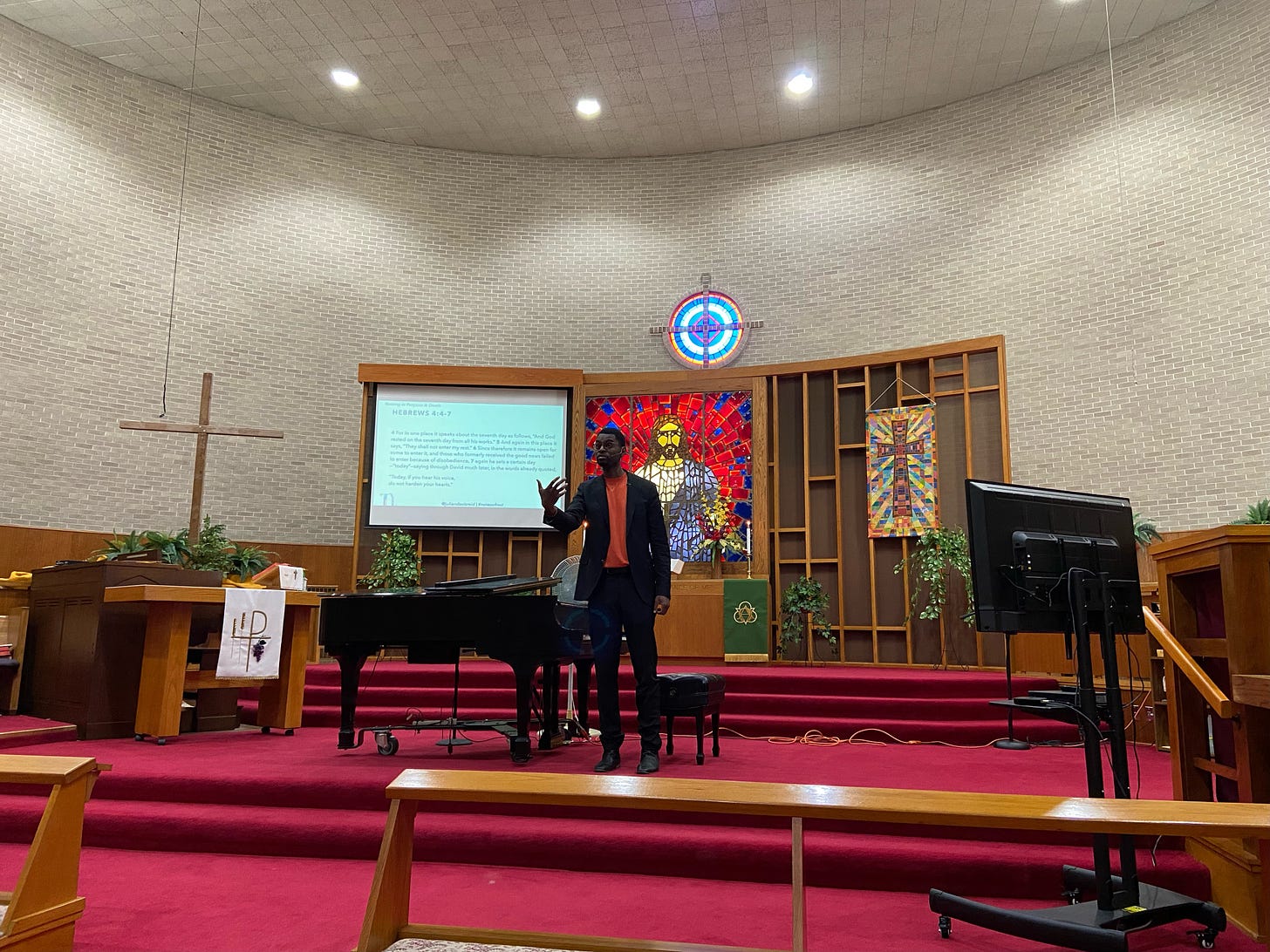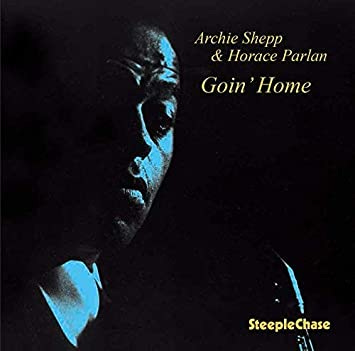The Fermata Weekly is the weekly recap & preview of my artistic activity, with special attention given to Notes of Rest, my contemplative-musical retreat, and The JuJu Exchange, my jazz-electronic fusion band.
Upcoming Appearances:
Sept 3-4: Notes of Rest at Plymouth Congregational Church UCC in Des Moines, IA, Sept 3-4 (The retreats will happen during Saturday evening & Sunday morning service, and then I will play a concert at 2p on Sunday afternoon at the church. Only Sunday’s content will livestream.)
Hi everyone,
This last Sunday, I had the joy of hosting my first Notes of Rest session in rural America. It was held at Mendota First United Methodist Church in Mendota, IL, about 90 minutes west of Chicago. (Mendota is known for its corn, and coincidentally had their annual Sweet Corn festival that afternoon!) We had a rich, still time exploring what it meant for them to rest in the purposes God has for them (Hebrews 4:4-11). You can watch the service here. The warm welcome from Rev. Bohall and the church was off the chain. I’m so thankful for being able to be a guest in these beautiful spaces of care.
One of the questions I asked during the retreat led to beautiful discoveries: how do the members of First UMC of Mendota help one another stay on the path to pursuing the final rest of God (that comes when we die)? Behind this question were two central ideas from the Scripture text: 1. fulfilling our purposes here on earth requires the accountability and strength of community, and 2. fulfilling our purposes here on earth leads to the final rest of God on the other side of death. In other words, to enter God’s final rest, we need each other.
During the time of communal sharing, one parishioner shared with the congregation her urgent and earnest answer to my question. Making eye contact with her nearby fellow parishioners, she insisted that she needed that church - the choir she sings in, the rhythm of the weekly gathering - and presumed that everybody else did too because of their routine attendance. She needed the routine, significance, and creativity that church and music provided.
The Need for Routine in Rural Illinois
The honesty in her voice called me to account. It made me ask critical questions about this current historical moment and the extent to which we in our individualistic society profess our need for community. So often the culture suggests that we don’t really need each other. We can keep each other at arms length or remain transient in our affections.
But what she was surfacing was a cherished yet scary feature of church life: Jesus calls us into the church to call us to depend on one another. In singing songs together and hearing about the stunning good news of Jesus given the impossibility of our goodness on our own, ideally in church we are reminded that we need each other for this journey. Her verve reminded me first that we were never made to be alone, and that the subtle and overt ways society encourages isolation is harmful to our purpose of life together and makes us vulnerable to the ways of death that counter God’s life for us. But upon further reflection, this Mendota churchgoer reminded me of a trip my wife Carmen and I took to a former slave plantation outside of Charleston, South Carolina years ago where I saw a different kind of need for community.
The Praise House in Antebellum South Carolina

At the historic Boone Hall Plantation in Mt. Pleasant, SC, Carmen and I got to see extant slave cabins. My goodness was that a trip. Amongst them was a praise house, which was a cabin where enslaved ancestors held weeknight worship services (sometimes to the chagrin of their masters). There they routinely gathered to sing, shout, and dance because God had been yet faithful to them despite the hell they were experiencing in slavery. They needed to let that shout out, and to do it together. A song alone makes some sound, but together in that house my ancestors were a chorus.
It’s interesting that the way this rural Illinois White woman relied on her community in the 21st century reminded me of Black ancestors relying on each other in antebellum South Carolina. It signals to me the power of God to use the church writ large and church music in particular to routinely draw all kinds of people to a place of vulnerability and honesty. For the parishioner in Mendota there was vulnerability in expressing her need for the other congregants. She was opening herself up to the possibility of them not responding in kind. And for the people on the plantation, there was vulnerability in gathering in that way under massah, choosing to worship in the praise house rather than pledge allegiance to the White dominated churches they otherwise could’ve attended.
Of course, reliance on one another in religious space is not always healthy, as we are seeing with the rise of Christian nationalism today. That is a kind of dependence in community that is dangerous. But this shouldn’t rule out the value of being dependent on a religious community. After all, isn’t it often the case that the great joys of life can easily be corrupted to become the great dangers? The waves and bonfires are both beauties and terrors. The difference lies in how we interact with them.
Many folk my age (I’m 31) see organized religion - and perhaps especially Christianity - as repulsive or worthy of severe censure because of that possibility for corruption. What I often gather from such conversations is that they see the wake of death behind religion - the terrors. This is an understandable aversion. But what I witnessed in that moment in Mendota and sensed in my bones on that Charleston plantation was a religious need that ushered in life, life of the community together.
Mendota and the Praise House points to the Latin origins of the term religion: religare, which means to relink or bind fast. These were moments of binding fast to one another and to God. Why do people keep coming to church? It’s in part because in binding fast, we can sing together and be obedient to God. In church, God invites us to rest in God’s purposes for our lives, which requires us interrogating and opening ourselves to our need to be with each other. We need each other to sing in choir. We need to preach to each other the good news of Jesus. We need to care for each other and imagine together. No matter the pains of this life, we can bind fast to the God who yet holds onto us and beckons us forward into eternal life. Just saying that makes my soul get happy!
abundantly,
Julian
A Musical Inspiration from the Week
I love this record by Archie Shepp & Horace Parlan called Goin’ Home. Hear the sense of need in Shepp’s tone on tenor saxophone.
My Other Reads
I draw so much from other Substack writers, so I’m going to start putting them here as addenda to my posts so you can get a taste of other cats who are widening my thinking.
In this post from Val Thinks, Val writes about how she cleaves to the good, constantly learning from the bad in her life such that it works towards her advantage. Val models how to rest from needless conflict and how to rest in purpose.







I feel this! When I spend time with my grandmother in rural NC, I often get to witness and/or participate in binding moments in her local church and it is truly reviving. In my work, it's also helping me to understand the blindspots (and potentially limits) of place-based policies trying to "create" "cohesive" communities absent this understanding of binding fast. Thank you for this reflection, fam. Hope y'all are doing well!
Thanks Julian for the mention!